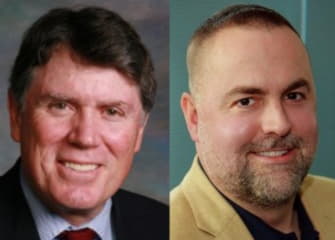
Scott Dorsey and Duane Carey
Click here for Part I, Part II, Part III, Part IV & Part V
Building connections between Maryland’s businesses and the people who represent them in government
Scott Dorsey is the CEO and chairman of MBRG—Maryland Business for Responsive Government. Duane Carey is the organization’s president. Since 1985, MBRG has educated the members of Maryland’s political and business communities on the questions, challenges, and opportunities facing the state’s private companies, with a focus on holding elected officials accountable to the overall goals of an improved business climate and sustained job growth. A nonpartisan institution, MBRG is supported by corporations, trade associations, chambers of commerce, and individuals.
EDWIN WARFIELD: What have you learned about politics over the years you’ve been involved in MBRG? How is our climate now compared to what it was in previous decades?
SCOTT DORSEY: It’s funny. When you become really involved in the process, and you understand how Annapolis works, it’s hard to remember that some people don’t know that. The Maryland legislature is so overwhelmingly progressive, democratic, liberal—whatever term you want to use—certainly not necessarily pro-business and pro-jobs. Any bill that the Democratic Party decides to pass will get passed, and if the Governor elects to veto that bill, the Democrats have the votes to override that veto.
In MBRG, we’re talking about jobs. I remember having a breakfast meeting with another one of our political leaders—this goes back probably 30 years—and I remember telling this person, “Wow, I get so frustrated as a real estate person”—I was getting a lot of permits back in the day—I wasn’t the CEO, I was probably gofer would be more like it—and I was seeing how some of the government policies were really not good for the government or for us, and I was so relieved when he said, “You know, you’re absolutely right, I agree with you completely.” I said, “Wow, great, this is wonderful.”
He said, “Here’s what you got to do, because see, I can’t vote for that, even though I agree with you completely. If I vote for that, I’m going to get killed in the next election, so what you’ve got to do is educate the electorate so that they will want me to vote for that and then it’ll all be good.” I realized then, that when I was probably in 3rd or 4th grade the vocabulary word was “oxymoron,” and the example that they always used was military intelligence, and I realized that probably political leadership would’ve been a better example.
The reason why personal income tax rates are so important is because the vast majority of business owners pay taxes as individuals, and when someone has to pay an exorbitantly high rate of tax, that’s capital that’s not available to be reinvested to grow that business, to hire more people. That’s why when we emphasize personal rates. It’s not because we want to have more money to spend. It’s because for at least 80% of businesses in Maryland, owners are paying taxes as individuals. It’s S corps and LLCs and partnerships. It’s the potential for us to really kickstart the Maryland economy and achieve the kind of results that we should have, given the resources. I mean like I said, we should be the Super Bowl winners. We should be a top-ten economy. We should be a state that other people look at and, “Go, wow, wish we could be Maryland.” A lot of states look at Maryland, they see the potential that we have, and they envy the potential that we have, and they also can’t understand why we don’t see that and why we’re not taking advantage of it. And that’s the message we need to get to the legislature.
DUANE CAREY: And then I think others do see why we can’t take advantage of that potential, and they see it as the legislature. We’ve got a national reputation. They’ve written about us in The Wall Street Journal. There’s a national reputation that “Yeah, we see that you’ve got a pro-business governor—he might be gone in a couple of years. I’m not sure I’m ready to take that leap, because as long as you’ve got that legislature that’s going like this, I don’t know that I can trust it.”
SCOTT DORSEY: If we could get enough pro-job legislators—
DUANE CAREY: —on both sides of the aisle—
SCOTT DORSEY: —both delegates and senators, it would change the dialogue. Right now, if not one pro-growth delegate or senator showed up, it wouldn’t matter. They would still have a quorum, they would have the votes to pass whatever they wanted to pass, and if Larry Hogan said, “I’m not going to sign it,” they’d say, “that’s fine, we don’t care.” If we can get just six or seven, it just changes that dynamic. All of a sudden, there has to be a conversation. There has to be a negotiation. That’s why it’s so critically important to get out. I’m not saying we need to be be majority pro-job. I mean that would be nice, but right now, the pro-job people are not even relevant. They’re not necessary to the process of governing, and that’s really not a healthy situation. Most of our elected officials, I think, if you get them in a moment of candor, honestly will tell you that government works best when there’s a balance, and there is a conversation and there is a negotiation and give and take. I don’t care whether it’s on this side of the aisle or that side of the aisle, it just works better. It’s the way our founding fathers designed our system of government: we need to be able to talk to each other, we need to be finding common ground. That’s where we’re trying to get to in Maryland.
DUANE CAREY: I was on a legislative panel a month or two ago, and the topic of the paid leave bill came up, which is a very big topic both this past session and the upcoming session. And very frankly, very openly to a room of 200 people, one of our senior senators said, very matter-of-factly, “Well, paid leave will pass this year. Period.” There’s a little bit of pushback, because the bill as it was constructed last year was a horrible bill. There were some excellent amendments put forth and Delegate Nic Kipke put them all together in what we call the Kipke Amendment, which really helped to fix a lot of them, and a lot of that is what’s in Governor Hogan’s proposed bill. What the Senator said was definitely going to pass because Mike Busch and Mike Miller want it to pass. That’s politics of Maryland, I mean that’s, that’s, that’s Scott’s point in a nutshell, and that’s not a healthy democracy.
SCOTT DORSEY: One thing that was interesting to me is back in 1987, actually, Mike Miller was serving in the Senate and Mike Busch was serving in the House of Delegates—he wasn’t the Speaker—In 1987, which is only the second year we had local numbers, you know, Mike Miller’s ranking was 83%. Mike Busch’s ranking was 100%.
By 2011, Mike Miller’s ranking that year was 11%; Mike Busch was 9%. Even last year, Miller was 40%, Busch was 30%. We really have had that movement away from the middle. On the one hand, you have the generally pro-jobs conservative side, and on the other side you have the folks that just don’t appreciate how much business, capitalism, and free enterprise can do to move the needle on prosperity and provide opportunity for everybody in the state of Maryland.
Connect with Scott and Duane on LinkedIn
Sponsored by:


A full-service commercial real estate firm with nearly 16 million square feet of office in more than 70 locations, Merritt owns and manages more commercial space than any privately held developer in the Baltimore/Washington area and have an unmatched reputation for our commitment to our customers.
Connect with Merritt Properties on LinkedIn, Facebook and Twitter


Edwin Warfield, CEO of citybizlist, conducts the CEO Interviews.
If you're interested in reaching CEOs, please contact edwin.warfield@citybuzz.co
Connect on LinkedIn















